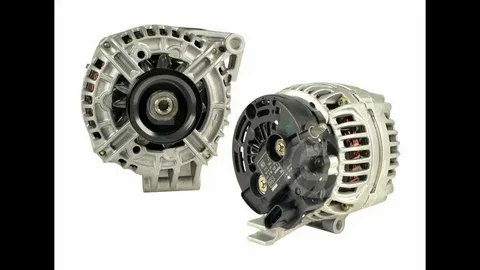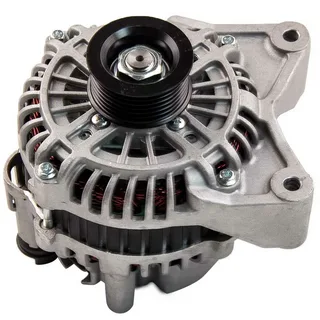The Falcon Alternator is a crucial component of a vehicle’s electrical system, responsible for charging the battery and powering various electrical components. As such, it plays a vital role in the overall functioning of a car. If you’re a car owner or mechanic, understanding how the AU Falcon Alternator works and how to maintain it properly is essential. This blog post will provide everything you need to know about the Falcon Alternator, from its function and components to troubleshooting tips and maintenance guidelines. So, let’s dive in and explore this essential part of your vehicle’s engine.
Understanding the Role of the Falcon Alternator
The Falcon Alternator, an unsung hero in your vehicle’s engine, is essentially your car’s mini power station. So, how does it perform its magic? It’s all about the magic of electromagnetism. When the engine runs, it spins the alternator pulley, which triggers the alternator to generate electric power. This power is used to keep your battery charged and supply electrical energy to your car’s many components that require it. Think of all the things you use while driving that rely on electrical power.
Your headlights, radio, windscreen wipers, electric windows, and let’s not forget the essential engine management systems. The Falcon Alternator keeps them all humming along without a glitch. But the alternator isn’t just a one-trick pony. It’s clever enough to produce a varying amount of power based on your vehicle’s needs. When you’re cruising along the motorway with only your headlights on, it produces less power. But throw in a torrential downpour, and you turn on the windscreen wipers, the heated rear window, and the heater fan. Your trusty Falcon Alternator steps up its game to meet the higher demand.
Signs of a Failing Falcon Alternator
Navigating the maze of car parts can be daunting, especially when something goes amiss. One component that’s particularly important to keep tabs on is your Falcon alternator. Spotting the signs of a failing alternator early can save you a lot of grief (and potentially a lot of money!). Here are some warning signals to keep your radar tuned in to.
- Pay attention to any unusual noises coming from your engine. If you hear a grinding or whining sound, it could be your alternator’s bearings calling for help. These sounds may become more noticeable as you accelerate.
- Your dashboard lights might hold some clues. A dim or flickering dashboard light, particularly the battery or charging light, is a classic indicator of alternator trouble. But don’t stop there. If your headlights are dimmer or brighter than usual, especially when running other electrical components like the air conditioning or radio, it could be a sign your alternator isn’t meeting the demand.
- It’s worth investigating your alternator if your battery is constantly running low or your vehicle has trouble starting. Remember, your alternator’s job is to recharge the battery, so a persistently low battery could mean your alternator isn’t pulling its weight.
 Replacing the Falcon Alternator
Replacing the Falcon Alternator
Changing your Falcon alternator isn’t for the faint-hearted, but if you’re a petrol head and feel up for the challenge, you’re in the right place. It’s important to remember that safety always comes first, so the initial move is disconnecting the battery before anything else. Once that’s done, it’s time to roll up your sleeves and gently remove the tired, old alternator. As the old saying goes, “out with the old, in with the new.”
You’re now set to fit the new alternator in the vacant spot. Once snugly in place, your new alternator is ready to connect to the battery. We’re almost there now – it’s just the testing phase left. Fire up your engine and take a moment to savour the sweet purr of your Falcon. Monitor the alternator’s operation and look for any warning signs of malfunction. If everything is running as smoothly as a freshly laid road, congratulations!
You’ve successfully replaced your Falcon alternator. Remember, if you’re not brimming with mechanical confidence, there’s no harm in seeking a qualified mechanic to take on the task. A professional hand can ensure your alternator replacement is performed correctly and safely. Whether you tackle the job yourself or enlist professional assistance, replacing your Falcon alternator when necessary is essential in preserving your vehicle’s performance and longevity.
Regular Maintenance of the AU Falcon Alternator
Keeping AU Falcon alternator in tip-top shape demands a bit of tender, loving care. An eye for detail and a regular maintenance regime can work wonders in warding off unexpected hitches and expensive repair jobs. First stop on your maintenance journey? The alternator belt. Please give it a thorough check-up, looking for any wear and tear that might spell trouble.
Your alternator deserves a good clean. Brush away any dust and debris that may have settled over time, allowing your alternator to breathe and function better. While you’re at it, watch out for any signs of wear, corrosion, or damage. Any imperfections caught early can prevent bigger issues down the line.
Remember to test the alternator’s charging capabilities. You want to ensure it’s charging your battery as efficiently as possible. If it isn’t, it may need expert attention. Regular maintenance of your Falcon alternator is all about staying proactive and observant. By showing your alternator a bit of regular care, you can keep it humming along happily, contributing to the smooth performance of your vehicle.
Ensuring the Longevity of Your Falcon Alternator
How about securing a long and healthy life for your Falcon alternator? With the right care, you can indeed prolong its lifespan. One significant way to do this is by avoiding unnecessary strain on your vehicle’s electrical systems. Indulging in luxuries like excessive use of air conditioning, lights, or radio can drain your battery quicker than usual. When your battery constantly runs low, it can add extra workload to your alternator, causing it to wear out prematurely. Another crucial aspect is shielding your alternator from extreme conditions. High temperatures and moisture can be villains in the story of your alternator’s lifespan.
Both can cause substantial damage to the alternator’s components, impairing its functionality. Therefore, maintaining the optimal conditions for your alternator is essential for its prolonged health. Remember, your alternator is a loyal friend who never backs down from responsibilities. It works tirelessly to power your vehicle’s many electrical systems and keep your journey smooth. Treating it with care and avoiding unnecessary stress ensures it continues to serve your vehicle reliably for many years. A happy and healthy alternator equals a happy and smoothly running Falcon vehicle!
Maximizing Falcon Alternator Performance
Are you looking to boost the performance of your Falcon alternator? You’ve hit the nail on the head with the right tactics. First and foremost, maintaining your battery’s health can significantly impact your alternator’s performance. Remember, a frail battery can burden your alternator, shortening its lifespan. When it’s time for a replacement, stick with Original Equipment Manufacturer (OEM) parts.
Why, you ask? They’ve been tailored to work harmoniously with your specific Falcon model. By opting for OEM parts, you’re securing an ideal fit, superior durability, and peak alternator performance. However, remember that maximizing your Falcon alternator’s performance isn’t about pushing it to its limits. Instead, it’s about taking care of it, understanding its capabilities and respecting its boundaries. Be mindful not to overwork it. A well-maintained alternator can provide optimal performance and significantly contribute to your vehicle’s smooth running.
Maximizing your Falcon alternator’s performance involves a careful balancing act. A combination of regular maintenance, using OEM parts, and not placing unnecessary strain on the alternator will go a long way in enhancing its output. Remember, it’s not about how hard you can push your alternator but how well you can take care of it. Stick with these guidelines, and you’ll be rewarded with a high-performing Falcon alternator, ready to power you through all your journeys.
Troubleshooting Falcon Alternator Problems
Do you need help with your Falcon alternator and figuring out where the issue lies? Don’t worry; we’re here to help you become a savvy troubleshooter. Identifying problems early is half the battle won. The common culprits causing mischief under the bonnet can often be a faulty voltage regulator, a tired alternator belt or a corroded alternator connector. Fear not; there’s a handy tool that can come to your rescue – the multimeter. With this gadget, you can measure the alternator’s output voltage and check whether it’s flexing within the right range.
But remember, while troubleshooting can be a rewarding venture, it’s also a task that requires a certain level of technical knowledge and comfort. Being cautious and mindful of your safety when dealing with electrical components is crucial. If you need more clarification or feel out of your depth, there’s no shame in calling in a professional. It’s always better to be safe than sorry. After all, it’s not just about keeping your Falcon running smoothly but also ensuring you enjoy a safe and stress-free driving experience. So, ready to roll up your sleeves and get troubleshooting?
FAQs
Q: How often should the AU Falcon Alternator be replaced?
A: There isn’t a specific timeframe for alternator replacement as its lifespan can vary greatly depending on various factors such as driving conditions, the vehicle’s electrical system usage, and overall vehicle maintenance. However, a typical alternator should last anywhere between 5 to 7 years or approximately 60,000 to 100,000 miles. If you notice any signs of a failing alternator, you should get it checked immediately.
Q: Can a bad alternator destroy a battery?
A: Yes, an underperforming alternator can certainly cause damage to your battery. The alternator is responsible for recharging the battery while your car is running. If it’s not doing its job properly, the battery will run down and could be damaged.
Q: What causes an alternator to fail prematurely?
A: A few factors can cause premature alternator failure. For instance, a faulty battery, a loose or worn belt, poor electrical connections, extreme weather conditions or just normal wear and tear can cause your alternator to fail sooner than expected.
Conclusion
Clear the Falcon alternator is a fundamental component to the optimal functioning of your vehicle. A firm grasp of its working, an alert eye for signs of wear and tear, dedicated maintenance, and a proactive approach to maximizing its lifespan and performance are all keys to averting costly repairs and keeping your Falcon roaring on the tarmac. Whether tackling alternator troubles head-on or knowing when to call in professional aid, each contributes to safeguarding your smooth ride. So, here’s to show your Falcon alternator the appreciation it merits, and in return, it’s sure to repay you with steadfast service.
| Other Good Articles to Read |
| blogs rain |
| Cme Blog Spot |
| Garcias Blogs |
| Yyc Blogs |
| Guiade Blogs |
| Blogs-Hunt |
| Impact-Blog |
| Smarty Blogs |
| Ed Blog |
| Mo Blogs |
| Blogs Em |
| blogs t |

